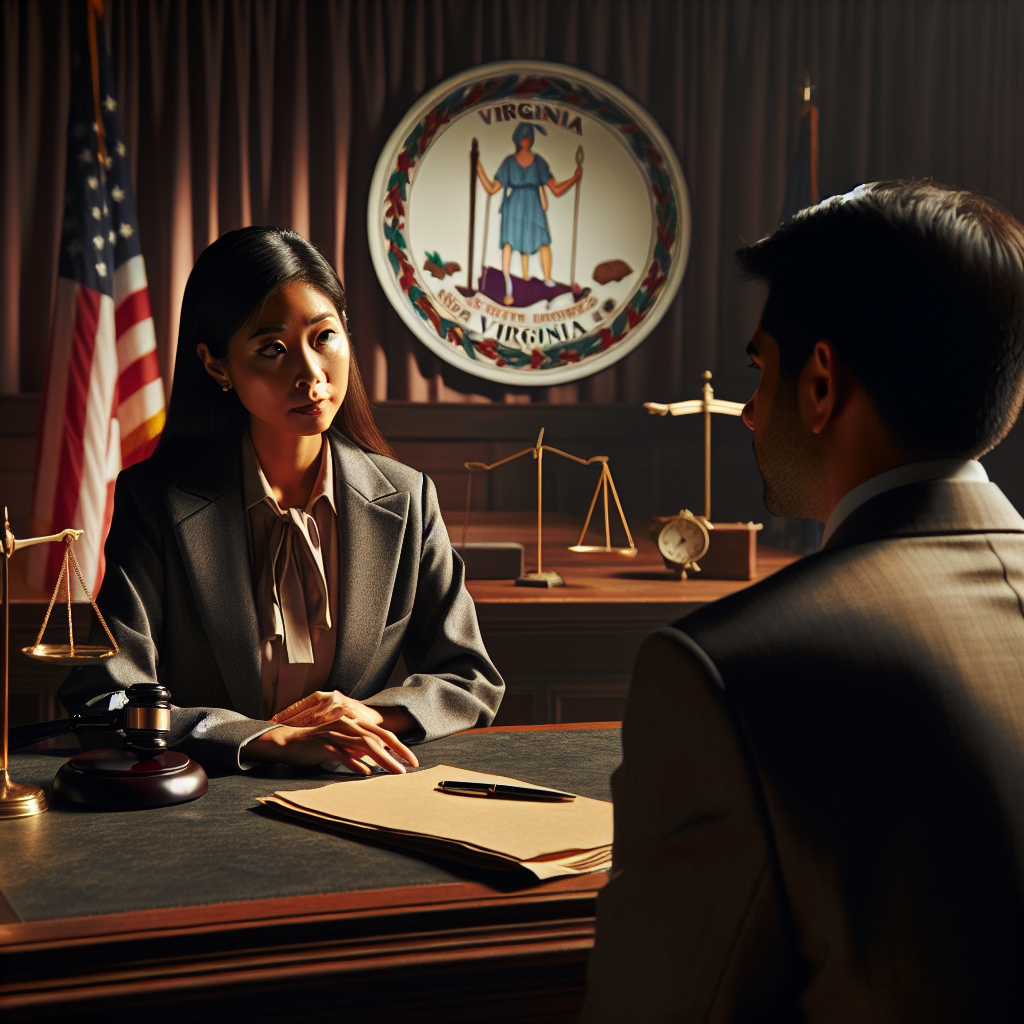Virginia DUI Laws: Your Guide to Safe and Legal Driving!
We are ready to assist you. Begin your legal journey today!
Navigating a Virginia DUI Charge: A Guide to Protecting Your Future
What is DUI/DWI Defense in Virginia?
DUI/DWI defense in Virginia is the comprehensive legal representation provided to individuals charged with operating a motor vehicle under the influence of alcohol or drugs, a violation of Virginia Code § 18.2-266. This defense involves a deep analysis of the traffic stop, the administration of sobriety tests, the accuracy of chemical tests (breath or blood), and all procedural aspects of the arrest to protect the defendant’s constitutional rights and challenge the prosecution’s case in court.
Key Takeaways
- An Arrest Is Not a Conviction: Being charged with DUI in Virginia is the beginning of a legal process, not the end. There are numerous opportunities to build a strong defense.
- The Stakes Are High: A conviction carries severe consequences, including mandatory jail time for repeat offenses, license suspension, significant fines, and a permanent criminal record that can affect your employment and future.
- Immediate Action is Crucial: The time immediately following an arrest is critical. Important deadlines, such as the window to challenge an administrative license suspension, can be missed without prompt legal guidance.
- Experience is Your Greatest Asset: The complexities of Virginia’s DUI laws and procedures demand a legal representative with deep, hands-on knowledge of how these cases are prosecuted and defended in the Commonwealth.
- A Strategic Defense is Possible: From questioning the legality of the initial traffic stop to challenging the scientific validity of a breathalyzer test, a knowledgeable attorney can identify weaknesses in the prosecution’s case.

That Sinking Feeling: The Moments After a DUI Arrest in Virginia
The flashing blue and red lights in your rearview mirror. The cold steel of handcuffs. The disorienting process of being booked at a police station. If you are reading this, you are likely reliving these moments, and your mind is racing with questions fueled by anxiety: “Will I go to jail?” “Will I lose my license?” “How will this affect my job and my family?”
I understand this state of fear and uncertainty because I have seen it from both sides. My name is Bryan Block, and before I dedicated my career to legal advocacy, I served for 15 years as a Virginia State Trooper. I conducted the traffic stops, administered the field sobriety tests, and made the arrests. That frontline experience gave me an unparalleled, first-hand understanding of police procedures, investigative techniques, and enforcement tactics—knowledge I now leverage to defend individuals just like you.
At the Law Offices Of SRIS, P.C., we recognize that you are not just a case number. You are a person facing a profound crisis that threatens your freedom, your financial stability, and your future. Our purpose is to replace your anxiety with clarity and your uncertainty with a strategic plan. This guide is your first step toward regaining control. We will walk you through the severe consequences of a Virginia DUI, demystify the complex legal process, and illuminate the strategic pathways toward a favorable outcome.
Table of Contents
- The Unyielding Consequences of a Virginia DUI Conviction
- Demystifying the Virginia DUI Legal Process: A Step-by-Step Guide
- The SRIS Virginia DUI Case Deconstruction Checklist
- Strategic Pathways to a Favorable Outcome
- Case Result Showcase: Our Experience in Action
- Overcoming Common Hesitations: Why Inaction is Your Biggest Threat
- Glossary of Key Virginia DUI Terms
- Frequently Asked Questions About Virginia DUI Charges
- Take the First Step Toward Protecting Your Future
- Disclaimer
The Unyielding Consequences of a Virginia DUI Conviction
In Virginia, a DUI is not treated as a simple mistake. The Commonwealth imposes some of the strictest penalties in the nation, designed to be punitive and life-altering. Understanding the full scope of what you are facing is the first step in appreciating the gravity of the charge. The penalties are governed by Virginia Code § 18.2-270 and escalate dramatically with each subsequent offense.
First Offense DUI
A first-time DUI conviction is a Class 1 Misdemeanor, the most serious class of misdemeanor in Virginia. The consequences are far more severe than a standard traffic ticket.
- Jail Time: While there is no mandatory minimum jail sentence for a standard first offense, a judge can impose a sentence of up to 12 months. However, if your Blood Alcohol Concentration (BAC) is 0.15% or higher, there is a mandatory minimum of 5 days in jail. If your BAC is 0.20% or higher, the mandatory minimum increases to 10 days.
- Fines: A mandatory minimum fine of $250, but it can be as high as $2,500.
- License Suspension: A mandatory 12-month license revocation. You may be eligible for a restricted license, but this is not guaranteed.
- Virginia Alcohol Safety Action Program (ASAP): You will be required to enroll in and complete this program at your own expense.
- Ignition Interlock Device: If your BAC was 0.15% or higher, or if you are granted a restricted license, you will be required to have an ignition interlock device installed on your vehicle for a minimum of 6 months.
Second Offense DUI
The penalties for a second DUI are significantly harsher, especially if the offense occurs within five years of the first.
- Mandatory Jail Time: If the second offense is within five years of the first, you face a mandatory minimum of 20 days in jail. If it’s within ten years, the mandatory minimum is 10 days. The maximum sentence remains 12 months.
- Fines: A mandatory minimum fine of $500, up to $2,500.
- License Suspension: A mandatory 3-year license revocation with very limited eligibility for a restricted license after a “hard suspension” period.
- Ignition Interlock Device: Required for a period of 6 months to 3 years as a condition of any restricted license or license restoration.
Third (and Subsequent) Offense DUI
A third DUI offense within ten years is a Class 6 Felony. A felony conviction carries devastating, lifelong consequences beyond the immediate court-ordered penalties.
- Mandatory Prison Time: A third offense within ten years carries a mandatory minimum sentence of 90 days in jail. If the third offense is within five years, the mandatory minimum sentence is six months. The maximum penalty is up to 5 years in a state penitentiary.
- Fines: A mandatory minimum fine of $1,000, up to $2,500.
- Indefinite License Revocation: Your license will be revoked indefinitely. You can petition for restoration after 5 years, but it is a difficult process.
- Vehicle Forfeiture: The Commonwealth may seize and forfeit your vehicle.
Collateral Consequences: The Hidden Penalties
Beyond the courtroom, a DUI conviction creates a ripple effect through your life:
- Criminal Record: A DUI conviction creates a permanent criminal record that cannot be expunged in Virginia. It will appear on background checks for the rest of your life.
- Employment: Many employers will not hire individuals with a DUI conviction, especially for jobs that require driving, professional licenses, or positions of trust. You could lose your current job.
- Security Clearances: A DUI can make it impossible to obtain or maintain a government security clearance.
- Insurance Rates: Your auto insurance premiums will skyrocket, and your provider may drop your coverage altogether, requiring you to obtain expensive FR-44 insurance.
Demystifying the Virginia DUI Legal Process: A Step-by-Step Guide
The journey from a DUI arrest to a final court date can be confusing and intimidating. Knowing what to expect can empower you to make informed decisions. Here is a general roadmap of the process.
- The Arrest: The process begins with a traffic stop. The officer must have “reasonable suspicion” to pull you over. They will then look for signs of impairment to establish “probable cause” for an arrest, often using Field Sobriety Tests (FSTs).
- Implied Consent and Chemical Tests: Under Virginia’s “implied consent” law, by driving on a Virginia road, you have agreed to provide a breath or blood sample if you are lawfully arrested for DUI. Refusing this test has its own separate and serious consequences, including an automatic license suspension.
- Booking and Bail: After the arrest, you will be taken to a police station for processing. You may be released on your own recognizance or have to post bail to be released before your first court date.
- The Arraignment: This is your first appearance in court. The judge will formally read the charges against you and ask you to enter a plea (not guilty, guilty, or no contest). This is a critical stage where you should have legal counsel to advise you. Pleading “not guilty” preserves all your rights and allows your attorney time to review the evidence.
- The Discovery Process: Your attorney will file a discovery motion to obtain all the evidence the prosecutor has against you. This includes the police report, officer’s notes, body cam and dash cam footage, and calibration records for the breathalyzer.
- Pre-Trial Motions: This is where an experienced defense attorney can truly make a difference. We analyze the evidence to identify legal issues and file motions to suppress evidence. This could involve challenging the legality of the traffic stop, the administration of the FSTs, or the admissibility of the breath/blood test results. A successful motion can severely weaken the prosecutor’s case, often leading to a reduction or dismissal of the charge.
- Trial or Plea Agreement: Based on the strength of the evidence, your case will either proceed to trial or your attorney will negotiate with the prosecutor for a plea agreement. A plea might involve reducing the DUI to a lesser charge like Reckless Driving. A trial involves presenting evidence and arguments before a judge (a bench trial) or a jury, who will then render a verdict of guilty or not guilty.
The SRIS Virginia DUI Case Deconstruction Checklist
A strong defense begins with a meticulous deconstruction of the prosecution’s case. As a former State Trooper, I know exactly where to look for procedural errors and weaknesses. This checklist is a starting point for the kind of analysis we conduct on every case. Use it to think critically about your own arrest.
- The Stop:
- What was the specific, articulable reason the officer gave for pulling you over? Was it a legitimate traffic violation (e.g., speeding, weaving) or was it a pretext?
- Did the officer observe your driving for a reasonable amount of time before initiating the stop?
- The Investigation:
- What specific observations did the officer note to justify detaining you for a DUI investigation (e.g., odor of alcohol, slurred speech, fumbling with documents)? Were these observations accurately recorded?
- Were you read your Miranda rights before any custodial interrogation (questioning designed to elicit incriminating responses after you were no longer free to leave)?
- The Field Sobriety Tests (FSTs):
- Did the officer properly instruct and demonstrate the tests according to National Highway Traffic Safety Administration (NHTSA) standards?
- Were the tests conducted on a level, well-lit, and dry surface, free from distractions?
- Did you have any medical conditions, injuries, or were you wearing footwear that could have affected your ability to perform the tests?
- The Chemical Test (Breath or Blood):
- Was the breathalyzer machine properly calibrated and maintained? We will demand the calibration and maintenance logs.
- Did the officer who administered the test hold a valid license to do so?
- Did the officer observe you for the required 20-minute period before the breath test to ensure you did not burp, regurgitate, or place anything in your mouth?
- If it was a blood test, was the blood drawn by qualified medical personnel, and was the chain of custody for the sample properly maintained?
Strategic Pathways to a Favorable Outcome
Many people mistakenly believe that if they failed a breath test, their case is unwinnable. This is simply not true. At the Law Offices Of SRIS, P.C., our experience shows that a proactive and knowledgeable defense can open up numerous pathways to a positive result. We don’t just accept the police report at face value; we challenge it at every turn.
Challenging the Traffic Stop
The Fourth Amendment protects you from unreasonable searches and seizures. If the officer did not have a valid, legal reason to pull you over in the first place, all evidence obtained as a result of that illegal stop—including the FSTs and the breath test—can be thrown out of court. This often results in a complete dismissal of the DUI charge.
Discrediting the Field Sobriety Tests
FSTs are not pass/fail tests; they are subjective evaluations of physical coordination that can be affected by dozens of factors other than alcohol, such as fatigue, nerves, or a pre-existing medical condition. My experience as a trooper gives me an insider’s perspective on how these tests are supposed to be administered versus how they often are in reality. We scrutinize body camera footage to find errors in the administration of the tests to argue they are not a reliable indicator of impairment.
Attacking the Breath or Blood Test
The breathalyzer is a machine, and machines can malfunction or be operated improperly. We meticulously review the device’s maintenance and calibration records. A history of errors or a failure to follow the strict legal protocol for administering the test can lead to the results being ruled inadmissible in court. Similarly, blood test results can be challenged based on issues with the blood draw procedure, sample storage, or the chain of custody.
Negotiating from a Position of Strength
When we successfully identify significant weaknesses in the prosecutor’s case through pre-trial motions, it fundamentally changes the negotiation dynamic. A prosecutor who knows their evidence might be suppressed at trial is often far more willing to negotiate a favorable plea agreement, such as reducing the DUI charge to Reckless Driving. This can be a significant victory, as it avoids the mandatory penalties and stigma associated with a DUI conviction.
Our Team
Experienced Attorneys Who Are Here To Help You!
Case Result Showcase: Our Experience in Action
Every case is unique, but our history of handling traffic and criminal matters in Virginia demonstrates our commitment to diligent preparation and strategic advocacy. Here are a few anonymized examples of outcomes we have secured for clients facing serious charges.
Charge: RECKLESS DRIVING BY SPEED 81/55
Jurisdiction: Sussex County General District Court
Outcome: REDUCED to improper driving, a simple traffic infraction.
Charge: DRIVING UNDER THE INFLUENCE (DUI – 1ST OFFENSE)
Jurisdiction: Fairfax County General District Court
Outcome: REDUCED to Reckless Driving.
Charge: RECKLESS DRIVING – GENERALLY
Jurisdiction: Prince William General District Court
Outcome: DISMISSED.
Charge: DRIVING WHILE SUSPENDED
Jurisdiction: Chesterfield General District Court
Outcome: DISMISSED.
Charge: DRIVING UNDER THE INFLUENCE (DUI – 1ST OFFENSE) W/ ELEVATED BAC
Jurisdiction: Loudoun County General District Court
Outcome: The original charge was AMENDED and REDUCED to a standard DUI-1st offense, avoiding the mandatory jail time associated with the elevated BAC.
Overcoming Common Hesitations: Why Inaction is Your Biggest Threat
Facing a DUI charge is overwhelming, and it’s natural to feel paralyzed by fear or to have questions that stop you from taking action. Let’s address those head-on.
“Maybe I should just plead guilty and get it over with.”
This is often the most costly mistake you can make. Pleading guilty means accepting the maximum possible consequences without a fight: a permanent criminal record, license suspension, fines, and potential jail time. You waive your right to challenge the evidence against you. The long-term cost of a conviction far outweighs the short-term discomfort of facing the charge with a seasoned advocate by your side.
“I can’t afford a knowledgeable lawyer.”
The more accurate question is, “Can you afford a DUI conviction?” Consider the total financial impact: thousands in fines and court costs, years of dramatically increased insurance premiums, and the potential loss of your job or future career opportunities. Investing in a strong legal defense is an investment in protecting your financial future from the devastating and long-lasting consequences of a conviction.
“My case seems hopeless; I failed the breath test.”
As we’ve detailed, the breath test result is just one piece of evidence, and it is far from infallible. An experienced DUI defense attorney knows that the legality of the stop, the procedure of the arrest, and the science behind the test are all fertile ground for a successful defense. Do not assume guilt. Let us deconstruct the case and find the weaknesses you cannot see.
Glossary of Key Virginia DUI Terms
Arraignment: Your first appearance in court where you are formally charged and asked to enter a plea.
BAC (Blood Alcohol Concentration): The percentage of alcohol in a person’s bloodstream. In Virginia, the legal limit for drivers over 21 is 0.08%.
Class 1 Misdemeanor: The most serious level of misdemeanor in Virginia, punishable by up to 12 months in jail and/or a fine of up to $2,500.
Class 6 Felony: The least serious level of felony in Virginia, but a felony nonetheless. It is punishable by one to five years in prison, or, at the discretion of a jury or the court, jail for not more than 12 months.
Implied Consent: The legal doctrine in Virginia (Virginia Code § 18.2-268.2) stating that by operating a vehicle on a public road, you have automatically consented to a chemical test of your blood or breath if lawfully arrested for DUI.
Ignition Interlock Device: A device installed in a vehicle that requires the driver to blow into a mouthpiece before starting the engine. It will not allow the engine to start if it detects a certain level of alcohol on the driver’s breath.
Nolle Prosequi: A Latin legal term meaning “will not prosecute.” It is a formal entry on the record by the prosecutor declaring that they will no longer pursue the case, effectively dropping the charges.
Virginia ASAP (Alcohol Safety Action Program): A state-mandated education and treatment program for individuals convicted of a DUI.
Frequently Asked Questions About Virginia DUI Charges
Yes, this is a common goal in DUI defense. An amendment from DUI to Reckless Driving (Virginia Code § 46.2-852) is a very favorable outcome. It avoids the mandatory license suspension and the permanent DUI on your record. This is typically achieved when your attorney successfully challenges key evidence, persuading the prosecutor that their DUI case is weak.
Refusing the official breath or blood test after a lawful arrest is a separate civil violation under the implied consent law. For a first offense, it results in an automatic 12-month administrative license suspension, with no possibility of a restricted license. This is in addition to any penalties you may face for the underlying DUI charge itself.
Not necessarily, but it is possible. For a standard first offense with a BAC below 0.15%, there is no mandatory jail time, but a judge has the discretion to impose up to 12 months. However, if your BAC is 0.15% to 0.20%, there is a mandatory minimum of 5 days in jail. If it's over 0.20%, the mandatory minimum is 10 days.
Forever. A DUI conviction in Virginia cannot be expunged from your criminal record. It will also remain on your Virginia DMV record for 11 years.
While you are legally allowed to represent yourself, it is highly inadvisable. The legal and scientific complexities of a DUI case are immense. The prosecutor is a trained attorney whose job is to secure a conviction. Without an equally knowledgeable advocate on your side, you are at a significant disadvantage and risk facing the maximum penalties.
Take the First Step Toward Protecting Your Future
The anxiety and fear you feel right now are real, but they do not have to define your future. The actions you take in the coming days will be the most critical. You have the right to a powerful defense, and our firm is here to provide it. With my unique background as a former Virginia State Trooper, I can analyze your case from a perspective few other attorneys can offer.
Let us help you move from a state of uncertainty to a position of strength and clarity. Contact the Law Offices Of SRIS, P.C. for a confidential case assessment. We will listen to your side of the story, answer your questions, and provide a clear, honest evaluation of your legal options.
Call us today at 888-437-7747.
Disclaimer
This website is for informational purposes only and does not constitute legal advice. The information contained herein is not intended to create, and receipt of it does not constitute, an attorney-client relationship. You should not act or refrain from acting based on this information without seeking professional legal counsel. Case results depend upon a variety of factors unique to each case and do not guarantee or predict a similar outcome in any future case.




Criminal Defense & Family Law
Mr. SRIS Licensed in VA, MD, NJ, NY, DCOwner & CEO – Former Prosecutor